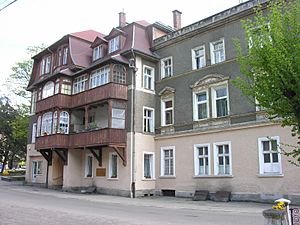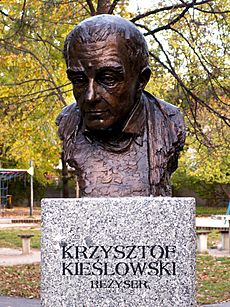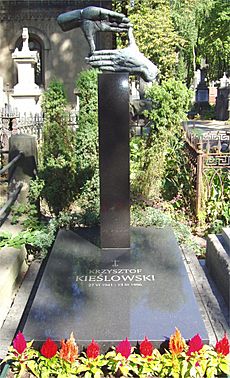Krzysztof Kieślowski facts for kids
Quick facts for kids
Krzysztof Kieślowski
|
|
|---|---|
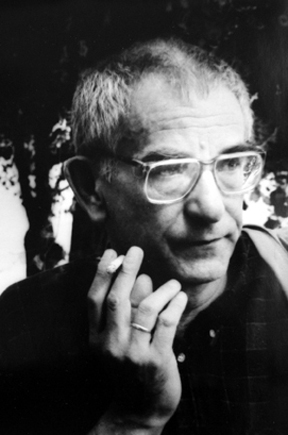
Kieślowski in 1994
|
|
| Born | 27 June 1941 Warsaw, German-occupied Poland
|
| Died | 13 March 1996 (aged 54) Warsaw, Poland
|
| Alma mater | National Film School in Łódź |
| Occupation | Film director, screenwriter |
| Spouse(s) |
Maria Cautillo
(m. 1967) |
| Children | 1 |
Krzysztof Kieślowski (pronounced: KSHISH-tof KYESH-lov-skee; 27 June 1941 – 13 March 1996) was a famous Polish film director and screenwriter. He is known around the world for his movies like Dekalog (1989), The Double Life of Veronique (1991), and the Three Colours series (1993–1994).
Kieślowski won many awards during his career. These include the Cannes Film Festival Jury Prize in 1988 and the Golden Lion at the Venice Film Festival in 1993. In 1995, he was even nominated for two Academy Awards (also known as the Oscars) for Best Director and Best Original Screenplay.
In 2002, a film magazine called Sight & Sound listed Kieślowski as the second-best film director of modern times. Another magazine, Total Film, ranked him at number 47 on its list of "100 Greatest Film Directors Ever" in 2007.
Contents
Early Life and Education
Krzysztof Kieślowski was born in Warsaw, Poland. His father was an engineer who had tuberculosis, a lung disease. Because of his father's health, Krzysztof grew up in many different small towns. They moved often so his father could find treatment.
Kieślowski was raised as a Roman Catholic. He said he had a "personal and private" connection with God. When he was sixteen, he tried a firefighters' training school but left after three months. He didn't have clear career plans.
In 1957, he joined the College for Theatre Technicians in Warsaw. A relative ran the school. He wanted to direct plays, but he needed a special degree for that. So, he decided to study film first, as a way to get into directing.
Filmmaking Career
After college, Kieślowski worked as a tailor for plays. He tried to get into the National Film School in Łódź, a famous school where directors like Roman Polanski studied. He was turned down twice. To avoid joining the military, he briefly studied art and even went on a strict diet to become medically unfit.
Finally, in 1964, on his third try, he was accepted into the film school's directing program. He studied there until 1968. Even though the government controlled what films could be made and stopped people from traveling, Kieślowski could travel around Poland for his film research. He eventually lost interest in theater and decided to make documentary films.
Early Films (1966–1980)
Kieślowski's first documentaries showed the daily lives of people in cities, workers, and soldiers. He didn't try to make political films, but showing real life in Poland often caused problems with the authorities. For example, his TV film Workers '71 showed workers talking about strikes. It was only shown after being heavily changed by censors.
After Workers '71, he made Curriculum Vitae. This film used real footage of government meetings. It also told a fictional story about a man being watched by officials. Kieślowski felt the film was against the government, but some people criticized him for working with the government to make it.
Kieślowski later stopped making documentaries. He felt that censorship made it hard to show the truth. Also, some of his footage from a film called Station (1981) was almost used as evidence in a crime. He realized that making fictional films gave him more artistic freedom. He also felt that fiction could sometimes show everyday life more truly.
Polish Films (1975–1988)
Kieślowski's first non-documentary film was Personnel (1975) for television. It won an award at the Mannheim Film Festival. This film and his next one, The Scar (Blizna), were about real-life social issues. Personnel was about theater workers, and The Scar showed how a town was affected by a badly planned factory.
These films looked like documentaries and used many non-actors. They showed daily life under a difficult system, but without directly criticizing it. Films like Camera Buff (Amator, 1979) and Blind Chance (Przypadek, 1981) focused more on the moral choices of one person. During this time, Kieślowski was part of a group of Polish directors known for making films about "moral anxiety."
His connections to these directors, especially Agnieszka Holland, worried the Polish government. Many of his early films were censored or had to be re-edited. Some were even banned. For example, Blind Chance was not released in Poland until 1987, six years after it was finished.
No End (Bez końca, 1984) was one of his most political films. It showed political trials in Poland during a time of strict government control. It was told from the unusual view of a lawyer's ghost and his wife. The film was criticized by the government, people who disagreed with the government, and the church.
Starting with No End, Kieślowski worked closely with two people. One was the composer Zbigniew Preisner, who wrote music for his films. The other was the lawyer Krzysztof Piesiewicz, who helped write the screenplays for all his later films. Preisner's music often played a big part in the films. Sometimes, characters in the films would talk about the music as if it was by a fictional Dutch composer named "Van den Budenmayer."
Dekalog (1988) was a series of ten short films made for Polish television. Each film was loosely based on one of the Ten Commandments. It is now considered one of the most important film series ever made. Kieślowski and Piesiewicz wrote the films together. Kieślowski originally planned for ten different directors to make the episodes, but he ended up directing all of them himself. Two of the episodes were released as longer movies: A Short Film About Killing and A Short Film About Love.
International Success (1990–1994)
Kieślowski's last four films were his most successful around the world. They were made with money from other countries, mainly France. These films explored big ideas about right and wrong, and the meaning of life. They had smaller casts and focused more on personal stories. Poland appeared in these films mostly through the eyes of people from other European countries.
The first of these was The Double Life of Veronique (La double vie de Veronique, 1990), starring Irène Jacob. This film's success helped Kieślowski get funding for his final, very ambitious films. These were the Three Colours trilogy (1993–1994): Blue, White, and Red. Each film explored one of the ideas symbolized by the French flag: liberty (freedom), equality, and fraternity (brotherhood).
The Three Colours films won many important international awards. These included the Golden Lion for Best Film at the Venice Film Festival and the Silver Bear for Best Director at the Berlin Film Festival. They also received three Oscar nominations.
After his last film, Red, premiered at the 1994 Cannes Film Festival, Kieślowski announced he was retiring from filmmaking.
Films After His Death
When Kieślowski died, he was working on another trilogy with his co-writer Piesiewicz. The films were called Heaven, Hell, and Purgatory. They were inspired by Dante's famous poem, The Divine Comedy. After Kieślowski's death, other directors adapted and made these scripts.
Heaven was directed by Tom Tykwer and released in 2002. Hell was directed by Danis Tanović and came out in 2005. The third film, Purgatory, has not yet been made.
Kieślowski often used the same actors in important roles in his films. Some of these actors include:
- Artur Barciś in No End, Dekalog, A Short Film About Love, and A Short Film About Killing
- Aleksander Bardini in No End, Dekalog, The Double Life of Veronique, and Three Colours: White
- Irène Jacob in The Double Life of Veronique and Three Colours: Red
- Jerzy Stuhr in The Scar, Camera Buff, Blind Chance, Dekalog, and Three Colours: White
- Grażyna Szapołowska in No End, Dekalog, and A Short Film About Love
- Zbigniew Zamachowski in Dekalog, and Three Colours: White
Personal Life
Kieślowski married Maria (Marysia) Cautillo on 21 January 1967, during his last year of film school. They had a daughter named Marta, born on 8 January 1972. They stayed married until his death.
He once said he had "one good characteristic, I am a pessimist. I always imagine the worst." People described him as someone who seemed to carry "the sadness of a world-weary sage."
Death and Legacy
On 13 March 1996, less than two years after he retired, Kieślowski died at age 54. He passed away during open-heart surgery after having a heart attack. He was buried in Powązki Cemetery in Warsaw. His grave has a unique sculpture of two hands forming a shape, like looking through a film camera.
Kieślowski is still one of Europe's most important directors. His films are studied in film classes at universities all over the world. A book from 1993, Kieślowski on Kieślowski, shares his life and work in his own words. There's also a film about him called Krzysztof Kieślowski: I'm So-So (1995).
Even though he said he was retiring, Kieślowski was working on new film ideas before he died. These included the "Heaven, Hell, and Purgatory" trilogy.
In 2011, a film festival called The Sokołowsko Film Festival: Hommage à Kieślowski started. It happens every year in Sokołowsko, where Kieślowski lived for part of his youth. The festival celebrates his work by showing his films and films by newer directors.
On June 27, 2021, Google honored his 80th birthday with a special Google Doodle on their homepage.
Filmography
Kieślowski wrote and directed 48 films in total. This includes 11 feature films, 19 documentaries, 12 TV films, and 6 short films.
Documentaries and Short Films
- The Office (Urząd 1966)
- Tramway (Tramwaj 1966)
- Concert of Requests (Koncert życzeń 1967)
- From the City of Łódź (Z miasta Łodzi 1968)
- I Was a Soldier (Byłem żołnierzem 1970)
- Factory (Fabryka 1970)
- Workers '71: Nothing About Us Without Us (Robotnicy '71: Nic o nas bez nas 1971)
- The Bricklayer (Murarz 1973)
- First Love (Pierwsza miłość 1974)
- Pedestrian Subway (Przejście podziemne 1974)
- Curriculum Vitae (Życiorys 1975)
- Hospital (Szpital 1976)
- From a Night Porter's Point of View (Z punktu widzenia nocnego portiera 1977)
- Seven Women of Different Ages (Siedem kobiet w roznym wieku 1978)
- Railway Station (Dworzec 1980)
- Talking Heads (Gadające glowy 1980)
- Seven Days a Week (Siedem dni tygodniu 1988)
Feature Films and TV Dramas
- Personnel (Personel TV drama 1975)
- The Scar (Blizna 1976)
- The Calm (Spokój 1976)
- Camera Buff (Amator 1979)
- No End (Bez końca 1985)
- Blind Chance (Przypadek made in 1981 but released in 1987)
- Dekalog (1988) (a series of 10 TV Films)
- A Short Film About Killing (Krótki film o zabijaniu 1988)
- A Short Film About Love (Krótki film o miłości 1988)
- The Double Life of Veronique (La Double vie de Veronique/Podwójne życie Weroniki 1991)
- Three Colours: Blue (Trois couleurs: Bleu/Trzy kolory: Niebieski 1993)
- Three Colours: White (Trois couleurs: Blanc/Trzy kolory: Biały 1994)
- Three Colours: Red (Trois couleurs: Rouge/Trzy kolory: Czerwony 1994)
Awards and Nominations
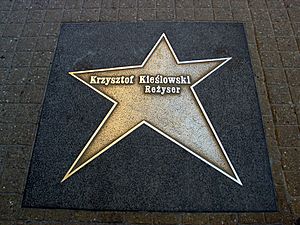
Krzysztof Kieślowski won many awards and was nominated for many others throughout his career. Here are some of the awards and nominations for his later work:
- A Short Film About Killing
- Bodil Award for Best European Film (1990) Won
- Cannes Film Festival FIPRESCI Prize (1988) Won
- Cannes Film Festival Jury Prize Won
- Cannes Film Festival Nomination for the Palme d'Or (1988)
- Dekalog
- Bodil Award for Best European Film (1991) Won
- Venice Film Festival FIPRESCI Prize (1989) Won
- The Double Life of Veronique
- Cannes Film Festival FIPRESCI Prize (1991) Won
- Cannes Film Festival Prize of the Ecumenical Jury (1991) Won
- Cannes Film Festival Nomination for the Palme d'Or (1991)
- Warsaw International Film Festival Audience Award (1991) Won
- Three Colours: Blue
- César Award Nomination for Best Director (1994)
- César Award Nomination for Best Film (1994)
- Venice Film Festival Golden Ciak Award (1993) Won
- Venice Film Festival Golden Lion Award (1993) Won
- Venice Film Festival OCIC Award (1993) Won
- Three Colours: White
- Berlin International Film Festival Silver Bear for Best Director (1994) Won
- Three Colours: Red
- Academy Award Nomination for Best Director (1995)
- Academy Award Nomination for Best Original Screenplay (1995)
- BAFTA Film Award Nomination for Best Film not in the English Language (1995)
- Bodil Award for Best Non-American Film (1995) Won
- Cannes Film Festival Nomination for the Palme d'Or (1994)
- Vancouver International Film Festival Most Popular Film (1994) Won
See also
 In Spanish: Krzysztof Kieślowski para niños
In Spanish: Krzysztof Kieślowski para niños
- Cinema of Poland
- List of Poles
 | Jackie Robinson |
 | Jack Johnson |
 | Althea Gibson |
 | Arthur Ashe |
 | Muhammad Ali |


